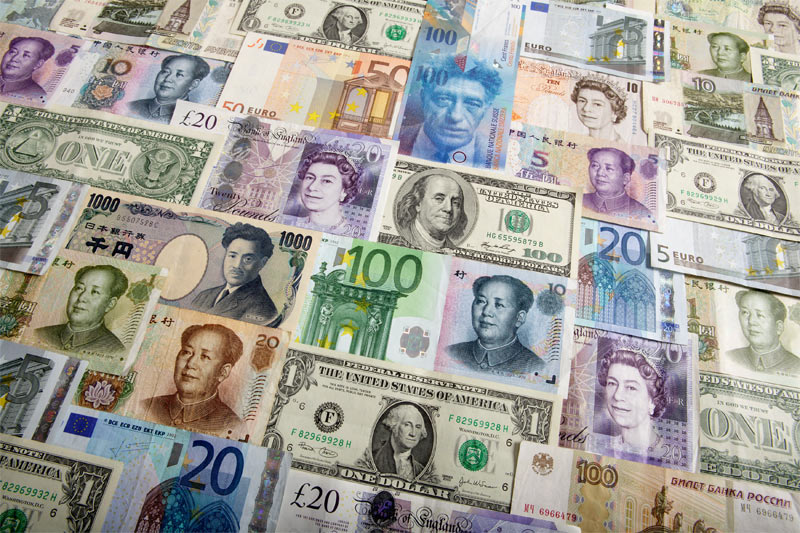Investing.com - The dollar was mixed against the other major currencies on Wednesday after U.S. retail sales for January were broadly in line with expectations and investors looked ahead to a meeting of finance ministers from the G20 later in the week.
During European afternoon trade, the dollar was lower against the euro, with EUR/USD rising 0.17% to 1.3475.
The euro came off session highs after German newspaper Bild reported that the European Central Bank is concernd that the stronger euro will hurt the recovery in the euro zone.
Earlier Wednesday, official data showed that industrial production in the euro zone rose 0.7% in December, beating expectations for a 0.2% increase.
The dollar hit six month highs against the pound, with USD/GBP falling 0.65% to 1.5558.
Sterling weakened broadly after the Bank of England said inflation is likely to be at around 2.3% in two years’ time, sharply higher than the 1.8% forecast in November, before falling back below the bank’s 2% target in the first quarter of 2016.
The bank said that economic growth was likely to remain below its pre-crisis levels until 2015 and that it stood ready to provide more stimulus to bolster the recovery.
Elsewhere, the dollar was little changed against the yen, with USD/JPY dipping 0.01% to 93.46.
Earlier Wednesday a G7 official said that Tuesday’s statement on exchange rates was aimed at indicating concerns over the speed of the yen’s recent depreciation rather than the currency’s current levels.
The G7 statement reaffirmed a commitment to market-determined exchange rates and said that fiscal and monetary policy won't target exchange rates.
Investors were also wary ahead of the outcome of the Bank of Japan’s policy meeting on Thursday although the bank was widely expected to hold off from announcing any changes to monetary policy before a new governor is appointed.
Elsewhere, the greenback dipped against the Swiss franc, with USD/CHF edging down 0.09% to 0.9163.
The greenback was mixed against its Canadian, Australian and New Zealand counterparts, with USD/CAD inching up 0.06% to 1.0028, AUD/USD climbing 0.37% to 1.0345 and NZD/USD inching up 0.01% to 0.8405.
The Australian dollar found support after a domestic index of consumer sentiment climbed sharply in January, indicating that a series of interest rate cuts are supporting confidence in the economy.
The dollar index, which tracks the performance of the greenback versus a basket of six other major currencies, dipped 0.06% to 80.06.
The Commerce Department said U.S. retail sales rose by a seasonally adjusted 0.1% in January, in line with expectations.
Core retail sales, which exclude automobile sales, increased by a 0.2%, beating expectations for a 0.1% gain.
During European afternoon trade, the dollar was lower against the euro, with EUR/USD rising 0.17% to 1.3475.
The euro came off session highs after German newspaper Bild reported that the European Central Bank is concernd that the stronger euro will hurt the recovery in the euro zone.
Earlier Wednesday, official data showed that industrial production in the euro zone rose 0.7% in December, beating expectations for a 0.2% increase.
The dollar hit six month highs against the pound, with USD/GBP falling 0.65% to 1.5558.
Sterling weakened broadly after the Bank of England said inflation is likely to be at around 2.3% in two years’ time, sharply higher than the 1.8% forecast in November, before falling back below the bank’s 2% target in the first quarter of 2016.
The bank said that economic growth was likely to remain below its pre-crisis levels until 2015 and that it stood ready to provide more stimulus to bolster the recovery.
Elsewhere, the dollar was little changed against the yen, with USD/JPY dipping 0.01% to 93.46.
Earlier Wednesday a G7 official said that Tuesday’s statement on exchange rates was aimed at indicating concerns over the speed of the yen’s recent depreciation rather than the currency’s current levels.
The G7 statement reaffirmed a commitment to market-determined exchange rates and said that fiscal and monetary policy won't target exchange rates.
Investors were also wary ahead of the outcome of the Bank of Japan’s policy meeting on Thursday although the bank was widely expected to hold off from announcing any changes to monetary policy before a new governor is appointed.
Elsewhere, the greenback dipped against the Swiss franc, with USD/CHF edging down 0.09% to 0.9163.
The greenback was mixed against its Canadian, Australian and New Zealand counterparts, with USD/CAD inching up 0.06% to 1.0028, AUD/USD climbing 0.37% to 1.0345 and NZD/USD inching up 0.01% to 0.8405.
The Australian dollar found support after a domestic index of consumer sentiment climbed sharply in January, indicating that a series of interest rate cuts are supporting confidence in the economy.
The dollar index, which tracks the performance of the greenback versus a basket of six other major currencies, dipped 0.06% to 80.06.
The Commerce Department said U.S. retail sales rose by a seasonally adjusted 0.1% in January, in line with expectations.
Core retail sales, which exclude automobile sales, increased by a 0.2%, beating expectations for a 0.1% gain.
